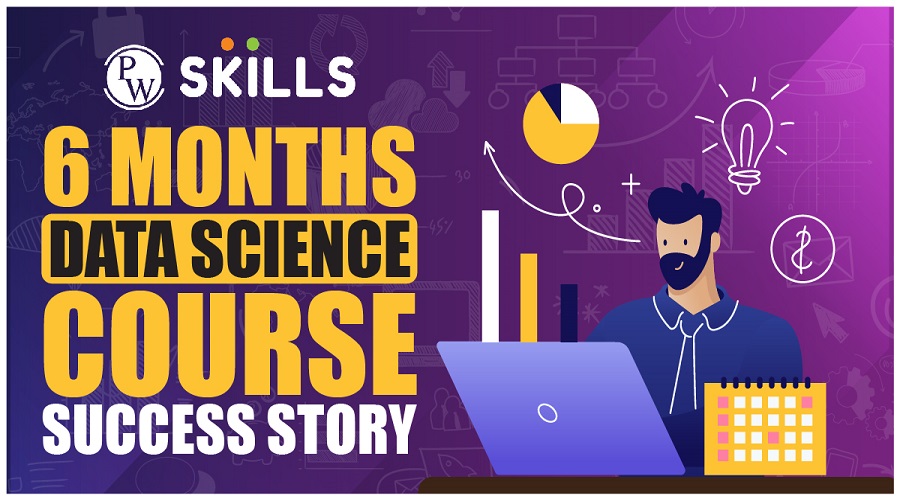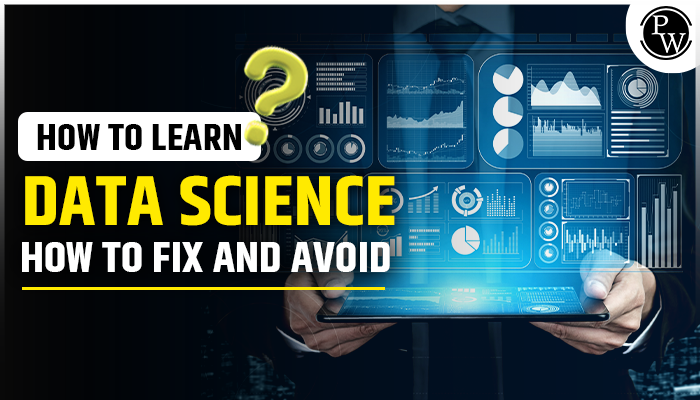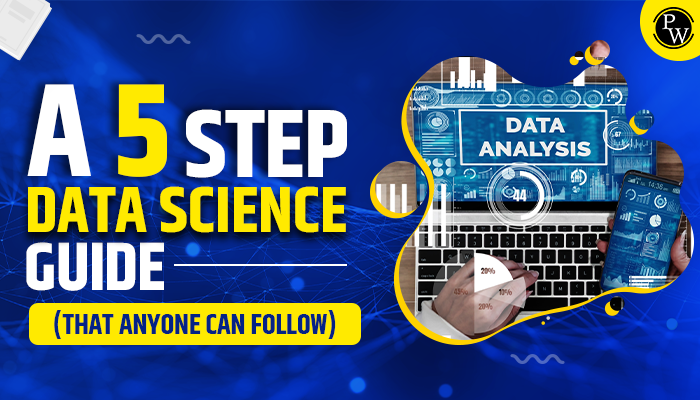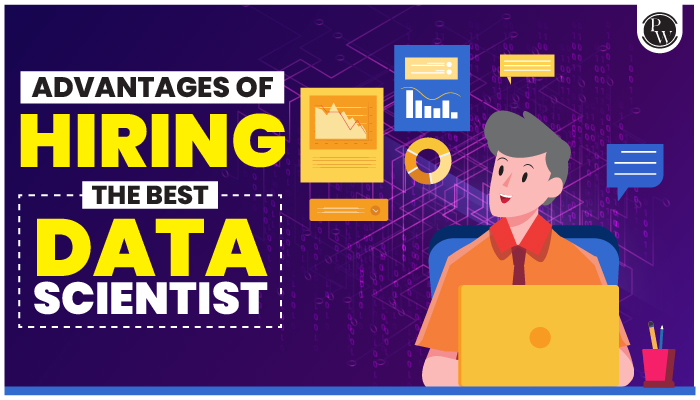Physics Wallah’s 6 Months Data Science Course With Generative AI is the best course to enroll for people who want to become a data scientist in 2024!
6 Months Data Science Course: Are you looking to kickstart your career in data science and become a successful data scientist by 2024? If yes, then brace yourself for an informative and motivational read ahead!
With numerous online courses claiming to make you a pro in just a few months, it can be overwhelming and confusing to choose the right path towards achieving your dream job.

But what if we told you that there is a way to become a successful data scientist in just 6 months? Yes, that’s right – in just half a year, you could be well on your way to an exciting new career! In this blog post, we will delve into the journey of one individual who successfully completed a 6-month data science course and is now working as a data scientist in 2024.
We’ll explore their story for inspiration as well as provide tips on how YOU can achieve this same level of success. So let’s dive in together and see how this could be your reality too!
How Many Months to Complete Data Science Course?
The duration to complete a data science course varies depending on the intensity and depth of the course. For someone with no prior coding or mathematical background, it typically takes between 6 to 12 months to learn both coding and data science fundamentals.
However, some experts suggest that most students can grasp the fundamentals in six months or even less, though this can depend on various factors such as dedication and prior experience. Specific courses like Data Science With Generative AI by Physics Wallah can even promise to turn someone into a data scientist in six months, but this often requires intensive training and dedication.
Can I become data scientist in 4 months?
Yes, it’s possible to become a data scientist in 4 months, but it largely depends on your prior knowledge and dedication. Here’s a breakdown:
- Basics: Start by learning the foundational skills of data science, which include programming languages like Python or R, and basic statistics and mathematics.
- Structured Learning: Follow structured courses or bootcamps that provide a comprehensive curriculum tailored for quick learning. Some professionals have achieved the skill set in 3 months, highlighting the possibility with dedicated effort.
- Prior Knowledge: If you already have a background in mathematics, statistics, or related fields, it can significantly expedite the learning process.
- Commitment: Stay committed and immerse yourself in continuous learning. Dedicate ample time daily to practice and apply the concepts you learn.
Step By Step Guide To Become A Data Scientist With 6 Months Data Science Course
Becoming a data scientist within a span of six months through an intensive course requires dedication, focus, and a structured approach. Here’s a step-by-step guide to help you achieve this goal:
1) Initial Research and Understanding:
- Duration: 1 week
- Familiarize yourself with what data science entails. Understand the roles, responsibilities, and typical workflows of a data scientist.
- Research available 6-month data science courses to ensure they cover essential topics and align with your learning goals.
2) Foundational Learning:
- Duration: 4-6 weeks
- Python or R: Start with one of these programming languages, preferably Python due to its popularity in the data science community.
- Focus on data structures, loops, functions, and libraries such as Pandas and NumPy.
- Basic Statistics: Cover topics like probability, descriptive statistics, hypothesis testing, and inferential statistics.
3) Dive into Data Manipulation and Visualization:
- Duration: 3-4 weeks
- Master data manipulation techniques using libraries like Pandas. Learn how to clean, preprocess, and transform data.
- Explore data visualization tools and libraries such as Matplotlib, Seaborn, or Plotly. Practice creating various types of plots to represent data effectively.
4) Introduction to Machine Learning:
- Duration: 4-6 weeks
- Begin with supervised learning algorithms:
- Regression (Linear, Logistic)
- Classification (Decision Trees, Random Forest, SVM)
- Evaluation metrics (Accuracy, Precision, Recall, F1-score)
- Delve into unsupervised learning:
- Clustering (K-means, Hierarchical)
- Dimensionality reduction techniques like PCA (Principal Component Analysis).
5) Advanced Topics and Specializations:
- Duration: 4-6 weeks
- Depending on your interest, delve deeper into specific areas:
- Natural Language Processing (NLP)
- Time Series Analysis
- Deep Learning (Basics of Neural Networks, CNNs, RNNs)
- Reinforcement Learning
6) Capstone Project:
- Duration: 6-8 weeks
- Implement a comprehensive project that integrates all the skills you’ve acquired. This project serves as a testament to your abilities and provides hands-on experience.
- Choose a real-world problem, gather data, perform analysis, develop models, and present your findings and solutions.
7) Portfolio Development:
- Duration: Continuous
- As you progress, document all your projects, assignments, and learnings. Create a professional portfolio showcasing your capabilities, projects, and skills.
- Platforms like GitHub can host your code repositories, while platforms like Kaggle or personal blogs can display project details.
8) Networking and Collaboration:
- Duration: Continuous
- Engage with the data science community by participating in forums, attending webinars, joining local meetups, or participating in hackathons.
- Collaborate on projects or challenges to gain diverse perspectives and learn from peers.
9) Continuous Learning and Updation:
- Duration: Continuous
- Data science is an ever-evolving field. Dedicate time to stay updated with the latest tools, techniques, research papers, and industry trends.
- Consider pursuing advanced courses, workshops, or certifications as you progress in your career.
10) Job Search and Application:
- Duration: 2-3 weeks
- Once you feel confident in your skills and have a solid portfolio, start applying for entry-level data science positions, internships, or freelance projects.
- Tailor your resume, prepare for interviews, and leverage your network to explore job opportunities.
Remember, while a 6-month course can provide a structured path, the key is consistent practice, hands-on experience, and continuous learning to become proficient in data science.
PW Data Science with ML 1.0 Course
After examining the various aspects of Physics Wallah’s Data Science with ML 1.0 course, it is evident that this is truly a game-changing course for anyone interested in the world of data science and machine learning. From its comprehensive curriculum to its user-friendly app “READER”, this course offers a unique blend of theoretical concepts and practical application that is essential for success in this rapidly growing field. Whether you are a beginner or an experienced data scientist, this course has something for everyone.
So why wait? Don’t just take my word for it, join the thousands of satisfied students who have already decoded data science with Machine Learning 1.0 by Physics Wallah and embark on your journey towards becoming a skilled and proficient data scientist. With determination and dedication, you too can excel in this field and make a difference in the world through the power of data.
So let us all pledge to embrace this opportunity and empower ourselves with knowledge by enrolling in Physics Wallah’s Data Science with ML 1.0 course today! Together, let’s decode the mysteries of data science and unlock endless possibilities for our future.
Remember, when it comes to mastering data science and machine learning, there is no better option than Decode Data Science With Machine Learning 1.0 by Physics Wallah- because knowledge truly is power!
IIT Delhi Data Science Course 2024
IIT Delhi has progressively introduced numerous Data Science certification programs. One notable addition is its MTech Program in Machine Intelligence & Data Science (MINDS), inaugurated in July 2022.
Currently, the most sought-after Data Science certification programs at IIT Delhi include the Certificate Programmes in Data Science & Machine Learning and the Advanced Certification in Data Science and Decision Science. Eligibility for these programs is extended to students with a 10+2+3 background or diploma holders. Furthermore, candidates should possess some experience in the software industry or related sectors. Admission to these courses is contingent upon an interview, a diverse profile assessment, and merit-based shortlisting.
The duration of these courses ranges between 6 to 12 months. Interested candidates can anticipate the commencement of registrations for the upcoming sessions in July 2023. For the latest updates on admission procedures and criteria, prospective students are advised to visit the official IIT Delhi website at https://home.iitd.ac.in/.
Recognizing the escalating demand for proficient Data Science and machine learning specialists, IIT Delhi extends its Continuing Education Program (CEP) in Data Science. This initiative aims to cultivate industry-ready professionals by offering a blend of theoretical and practical insights. Participants are equipped with practical knowledge, especially in areas like ML algorithms and statistical models, aligning with industry requirements.
The curriculum of IIT Delhi’s Data Science programs encompasses pivotal subjects like Data Science fundamentals, statistics, Machine Learning, Deep Learning, and Data analysis. These comprehensive courses cater to graduates, diploma holders, or individuals aspiring to venture into the realm of Data Science.
| IIT Delhi Data Science Course 2024 | ||
| Course Name | Duration | Fees |
| Certificate Programme in Data Science & Machine Learning | 6 months | INR 1,25,000 |
| Advanced Certification in Data Science and Decision Science | 12 months | INR 1,75,000 |
IIT Data Science Course Online
IIT Delhi’s Data Science courses fall under the Continuing Education Program (CEP) and have a duration of 6 to 12 months, accessible through online mode. Here are the specifics of the Online Data Science course offered by IIT Delhi:
Course Structure:
- The Online Data Science Courses feature live online sessions conducted every Sunday, spanning 3 hours, commencing from 12:15 PM to 3:15 PM.
Certification:
- Upon successful completion of the course with a minimum aggregate of 50% marks in any two out of three quizzes and a minimum attendance of 70%, participants will receive a certificate of completion issued by IIT Delhi.
- Learners scoring below 50% in the evaluation components, but maintaining a minimum attendance of 90%, will be awarded a participation certificate.
Eligibility Criteria:
- Graduates and Diploma degree holders are eligible to enroll in IIT Data Science Courses.
- Applicants with a robust mathematical background at the 12th-grade level or a background in statistics at the undergraduate level are often preferred.
Fees:
- The fees for IIT Delhi Online Data Science courses fall within the range of INR 1,25,000 to 1,75,000.
These courses are structured to accommodate working professionals and individuals aspiring to enhance their skills in Data Science, providing a flexible and accessible learning pathway.
Also Read: How to Get Data Science Internship in 15 Days
IIT Delhi Data Science Course Fees
To enroll in various CEP programs, candidates must initially fulfill specific prerequisites. This includes holding a diploma or having graduated from an accredited university.
These courses are aptly designed for professionals and individuals seeking opportunities in the Data Science industry. If relevant, applicants are required to provide an experience certificate along with the requisite application fee. Those with a robust foundation in mathematics and statistics are given precedence during the selection process.
The selection criteria involve evaluating eligibility followed by a subsequent screening process overseen by the Programme Coordinator, which may include interview rounds. Upon admission, candidates are expected to settle the program fees either through installment payments or a lump sum within a seven-day window.
IIT Delhi provides Data Science courses priced between INR 1,25,000 to 1,75,000. Please note that additional GST charges apply to these fees. Below is a breakdown of the fee structure for IIT Delhi’s Data Science courses.
| IIT Delhi Data Science Course Fees | ||
| Course Name | Duration | Fees |
| Certificate Programme in Data Science & Machine Learning | 6 months | INR 1,25,000 + GST |
| Advanced Certification in Data Science and Decision Science | 12 months | INR 1,75,000 + 18% GST |
IIT Data Science Course for Working Professionals
For working professionals interested in enhancing their data science skills, IIT (Indian Institute of Technology) offers specialized courses:
- Masters in Data Science and Business Analytics: This program aims to equip professionals with skills to make data-driven decisions and tackle intricate business challenges.
- IIT Madras Diploma Program: IIT Madras provides a comprehensive diploma program in data science, blending online learning with in-person assessments, catering to those aiming to build a career in programming or data.
These programs are tailored for professionals seeking to advance their expertise in data science, enabling them to navigate the complexities of the field effectively.
Also Read: Top 10 Data Science Institutes in India in 2024
Skills Required To Become a Data Scientist
Becoming a data scientist requires a blend of technical, analytical, and soft skills. Here’s a comprehensive list of skills you’d typically need:
1) Programming Skills:
- Python or R: Mastery over one or both of these languages is essential for data manipulation, analysis, and visualization.
- SQL: Ability to work with relational databases and extract data using SQL.
2) Statistical Analysis and Mathematics:
- Understanding of statistical tests, distributions, maximum likelihood estimators, hypothesis testing, and other statistical methods.
- Proficiency in linear algebra, calculus, probability, and other advanced mathematical concepts.
3) Machine Learning and AI:
- Familiarity with machine learning algorithms such as regression, classification, clustering, neural networks, decision trees, etc.
- Experience in frameworks like TensorFlow, Keras, Scikit-learn, and PyTorch.
4) Data Wrangling and Visualization:
- Ability to clean, preprocess, and transform raw data into a usable format.
- Skills in data visualization tools like Matplotlib, Seaborn, ggplot, and Tableau to represent findings effectively.
5) Big Data Technologies:
- Familiarity with tools and platforms like Hadoop, Spark, Kafka, and Hive for handling and processing large datasets.
6) Data Mining and Data Cleaning:
- Techniques to extract patterns, trends, and insights from complex datasets.
- Ability to handle missing data, outliers, and ensure data quality.
7) Domain Knowledge:
- Depending on the industry or sector you’re working in (e.g., healthcare, finance, e-commerce), having domain-specific knowledge can be beneficial.
8) Problem-solving Skills:
- Critical thinking and the ability to approach complex problems with a structured methodology.
9) Communication Skills:
- Ability to convey complex findings in a clear and understandable manner to non-technical stakeholders.
- Skills in creating reports, presentations, and documentation.
10) Collaboration and Teamwork:
- Working effectively in interdisciplinary teams, collaborating with other data professionals, engineers, business analysts, and stakeholders.
11) Continuous Learning:
- The field of data science is ever-evolving. Being committed to continuous learning and staying updated with the latest techniques, tools, and trends is crucial.
How do you Become a Data Scientist With No Experience?
Becoming a data scientist with no prior experience requires dedication, a structured approach to learning, and hands-on practice. Here’s a step-by-step guide to help you transition into the field:
1) Understand the Role and Responsibilities:
- Research what data scientists do on a day-to-day basis. This will give you clarity on the skills you need to develop.
2) Start with the Basics:
- Learn Python or R: These are fundamental programming languages in data science. There are numerous online platforms like Coursera, Udemy, and Codecademy that offer beginner-friendly courses.
- Get familiar with SQL: SQL is essential for working with databases, which you’ll often encounter in data-related roles.
3) Deepen Your Understanding of Statistics and Mathematics:
- Focus on foundational concepts like probability, descriptive and inferential statistics, hypothesis testing, and linear algebra. Online platforms like Khan Academy, Coursera, or edX offer courses on these topics.
4) Dive into Machine Learning:
- Start with the basics of machine learning algorithms. Platforms like Coursera (offering courses like Andrew Ng’s Machine Learning) or edX have comprehensive courses to get you started.
- Implement projects using datasets from platforms like Kaggle. This will help you apply theoretical knowledge in practical scenarios.
5) Build a Portfolio:
- Create projects that showcase your skills. Even if they’re based on publicly available datasets, having a portfolio demonstrates your practical abilities to potential employers.
- Participate in data science competitions on platforms like Kaggle or DrivenData. This not only gives you practical exposure but also allows you to learn from others’ solutions and feedback.
6) Networking:
- Join data science forums, communities, and local meetups. Platforms like LinkedIn can also be instrumental in connecting with professionals in the field.
- Consider attending workshops, webinars, or conferences related to data science. This will help you stay updated and expand your network.
7) Consider Formal Education or Bootcamps:
- If feasible, consider pursuing a master’s degree in data science, analytics, or a related field. Alternatively, there are many reputable data science bootcamps that offer intensive, hands-on training over a shorter duration.
8) Apply for Entry-Level Positions:
- Look for junior data analyst or data science intern roles. These positions can be stepping stones to more advanced roles as you gain experience.
- Emphasize your projects, portfolio, and any certifications or bootcamps you’ve completed during the application process.
9) Continuous Learning:
- The field of data science is continually evolving with new techniques, tools, and methodologies. Dedicate time to stay updated, learn from industry experts, and expand your skill set.
10) Soft Skills Matter:
- Develop your communication, problem-solving, and critical thinking skills. Being able to convey complex findings in a clear manner and work collaboratively is crucial in data science roles.
Also Read: Top 10 Data Science Applications and Real Life Examples (2024)
PW Generative AI Data Science Course
The Physics Wallah Generative AI: Data Science Course is a comprehensive and engaging program that will equip you with the necessary skills to excel in the rapidly-evolving world of data science. From learning the basics of Python and Machine Learning to understanding advanced concepts like natural language processing and computer vision, this course covers it all.
And what makes this course truly stand out is its unique approach to teaching – through interactive videos and practical coding assignments, Master PW’s team’s passion for both physics and data science shines through, making even the most complex topics easy to grasp.
So if you’re looking to embark on a journey towards mastering generative AI, look no further than this course. Trust me when we say, as someone who has personally taken this course, that it is the best investment you can make for your future in data science. Don’t just take my word for it though, enroll in the Physics Wallah Generative AI: Data Science Course today and experience its transformative power for yourself! Happy learning!
6 Months Data Science Course FAQs
Is 3 months enough for data science?
Three months can provide a foundational understanding of data science concepts, but mastering the field typically requires more extensive learning and practical experience. It's a good starting point but may not cover advanced topics comprehensively.
Who is this course suitable for?
This course is ideal for individuals aiming to quickly acquire skills in data science, including recent graduates, working professionals looking for a career switch, and anyone interested in enhancing their data analytics abilities.
What topics are covered in the 6 Months Data Science Course?
The course typically covers fundamental topics such as data manipulation, statistical analysis, machine learning algorithms, data visualization, and practical applications using tools like Python, R, and SQL.
Do I need any prior knowledge or experience in data science?
While prior knowledge is beneficial, many 6-month courses are designed to cater to beginners. However, having a basic understanding of mathematics and some familiarity with programming languages like Python can be advantageous.
Can I learn data science in 6 months?
Yes, a 6-month period can offer a solid introduction and intermediate-level understanding of data science concepts. However, becoming proficient or mastering the field may require continuous learning beyond the 6-month timeframe and practical application of skills.




